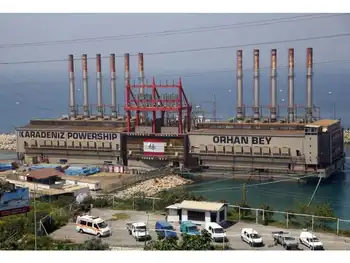Cape Wind attempt for loan on hold
By Tri-City Herald
Arc Flash Training CSA Z462 - Electrical Safety Essentials
Our customized live online or in‑person group training can be delivered to your staff at your location.

- Live Online
- 6 hours Instructor-led
- Group Training Available
In a recent letter, the department said with the multi-billion dollar loan program's September expiration date approaching, remaining funds would be used on projects whose applications were further along.
"This is not a statement about the quality of your project, but simply about its readiness to proceed at this time," read the letter, sent to Cape Wind and other applicants whose projects were placed on hold.
The letter said if the federal loan guarantee program received more funding, the department could resume working on Cape Wind's application. But Jonathan Silver, director of the loan program, made no promises.
"We must caution you, however, that there is no assurance that we will ever be in a position to continue our evaluation of your project," his letter read.
Company spokesman Mark Rodgers declined comment on how big a piece the possible loan guarantee was projected to be in the overall financing of the 130-turbine project, estimated to cost $2.6 billion.
He said Cape Wind was pursuing all financing options, with Barclays Bank as its adviser. The company has "a long and successful history" of winning financing for energy development projects, Rodgers said in an email.
The state's political leaders had pushed hard for the loan guarantee, with Sen. John Kerry writing a February letter to Energy Secretary Steven Chu, signed by all 10 Massachusetts members of the U.S. House that asked Chu to speed up Cape Wind's loan guarantee application.
He said a timely approval would "help this first U.S. offshore wind project secure financing in this challenging financial market."
Cape Wind said it would still seek the loan guarantee, because it would reduce costs for state electricity customers. The company has a 15-year deal to sell the utility National Grid half its power starting in 2013 at 18.7 cents per kilowatt hour, with the cost increasing 3.5 percent annually. But the state attorney general has estimated that a Department of Energy loan at 5 percent interest would drop the starting price for Cape Wind's power to about 17.3 cents per kilowatt hour.
Cape Wind, planned for Nantucket Sound, has been ceaselessly opposed by critics who say it threatens the local environment and maritime industry, and it's power is too expensive. Onshore wind in Massachusetts, by comparison, costs around 9 to 10 cents per kilowatt hour.
Audra Parker of the Alliance to Protect Nantucket Sound, the project's chief opponent, called the Department of Energy decision's "a major setback for Cape Wind" adding it "clearly shows the project is not a done deal."
Project advocates say Cape Wind is a good value for its many benefits, including creating hundreds of jobs, providing a large source of renewable energy just off a heavily populated coast and kick starting a new renewable energy industry in the United States.
A decade after the project was proposed, Cape Wind last month received federal approval of its construction and operations plan. That cleared the way for work to begin as early as this fall.
Cape Wind plans to be producing power by early 2013. Asked if the start date might be delayed by the Department of Energy's decision, Rodgers said, "We are working hard to prevent any delay which would make the United States fall further behind Europe and China in the critical field of offshore wind power development."











